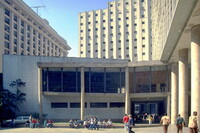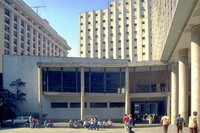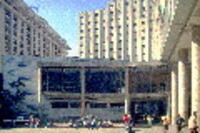| dc.coverage.spatial | Site: Rio de Janeiro, Sudeste, Brazil | en_US |
| dc.coverage.temporal | 1937-1943 (creation) | en_US |
| dc.creator | Niemeyer, Oscar | en_US |
| dc.creator | Le Corbusier | en_US |
| dc.creator | Costa, Lúcio | en_US |
| dc.date | 1937-1943 | en_US |
| dc.date.accessioned | 2013-05-07T20:19:54Z | |
| dc.date.available | 2013-05-07T20:19:54Z | |
| dc.date.issued | 1937-1943 | en_US |
| dc.identifier | 214617 | en_US |
| dc.identifier.other | archrefid: 1317 | en_US |
| dc.identifier.uri | http://hdl.handle.net/1721.3/121984 | |
| dc.description | View of entry on north portion of west façade; In 1936 Niemeyer joined the team assembled by Costa to design the Ministry of Education and Health (1937-1943; now the Palácio da Cultura). The team included Affonso Eduardo Reidy, Jorge Moreira, Leão and Hernani Mendes de Vasconcelos, who were all at the Escola Nacional de Belas Artes during Costa's reforms and were among those whose work was praised by Frank Lloyd Wright when he attended the first Salão de Arquitetura Tropical (1933) in Rio. As a member of this team Niemeyer came under the direct influence of Le Corbusier, who spent a month in Rio in 1936 as consultant on the project. Niemeyer was responsible for many of the design details of this highly influential building, and he subsequently took over leadership of the team (1939), but the Ministry building was built largely to Le Corbusier's design and bears all the hallmarks of his hand: pilotis, brises-soleil in the form of horizontal louvres on the exposed façade, and sculptural rooftop elements--features so well suited to the Brazilian culture and climate that they were widely adopted thereafter. Although this influence is clearly evident in Niemeyer's later work, it is his own daring originality and imagination, often portrayed in rapid, graphic sketches reminiscent of Le Corbusier's, that characterize his most memorable buildings. Source: Grove Art Online; http://www.groveart.com/ (accessed 3/7/2008) | en_US |
| dc.format.medium | concrete; glass | en_US |
| dc.rights | © Scott Gilchrist, Archivision, Inc. | en_US |
| dc.subject | architectural exteriors | en_US |
| dc.subject | Modernist | en_US |
| dc.title | Ministry of Education and Health | en_US |
| dc.title.alternative | Palácio da Cultura | en_US |
| dc.title.alternative | Palácio Gustavo Capanema | en_US |
| dc.type | image | en_US |
| dc.rights.access | Licensed for educational and research use by the MIT community only | en_US |
| dc.identifier.vendorcode | 1A1-NO-ME-C1 | en_US |
| vra.culturalContext | Brazilian | en_US |
| vra.technique | construction (assembling) | en_US |
| vra.worktype | ministry (government office building) | en_US |
| dc.contributor.display | Le Corbusier (Swiss architect, 1887-1965); Lúcio Costa (Brazilian architect, 1902-1998); Oscar Niemeyer (Brazilian architect, born 1907) and others | en_US |


